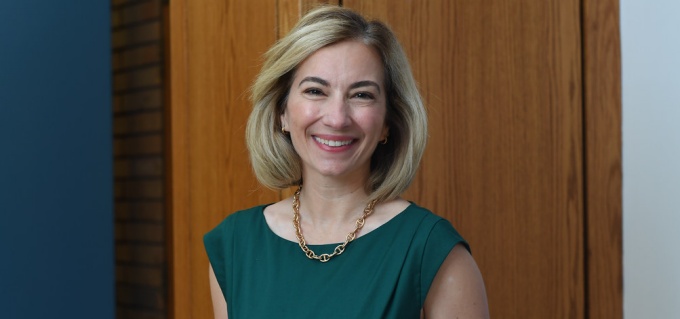
A new advocate for academic life
Professor Christine Bartholomew named vice dean for academic affairs
UB School of Law’s new vice dean for academic affairs, Professor Christine Bartholomew, is no stranger to the challenge of continually improving the law school’s academic offerings.
When the law school established its Committee on Curricular Innovation and Pedagogy in 2016, Bartholomew served as its inaugural chair, and she has continued to assist with leading those efforts ever since. She helped develop a rigorous program of learning outcomes and procedures for assessing student progress, and on the university level, she represents the law school on the Institutional Assessment Council, which advises UB’s Office of Curriculum, Assessment and Teaching Transformation.
Bartholomew, an expert in antitrust law and civil procedure, also has been a prolific scholar, with articles in leading law reviews published at Duke, UCLA, Fordham, the University of Virginia and Vanderbilt, and her work has been cited by state and federal courts. She serves as an assistant editor of the ABA Antitrust Law Journal and a contributing editor for Jotwell.
A conversation with Vice Dean Bartholomew offers her perspectives about the law school’s academic mission.
UB Law is known for the ways faculty members brainstorm, collaborate and challenge each other in their scholarly work. Is there anything the administration can do to facilitate that ferment, or does it happen organically?
One of the most enriching aspects of my academic life has been scholarly collaboration. While those connections can take root organically, that takes considerable time. The administration can—and in my way of thinking should—play a role in expediting that process. Those connections start with senior leadership that recognizes and values scholarship’s potential to change the legal system and legal thought. From there, the administration needs to promote opportunities to connect new and existing faculty, be it through workshops, lunch roundtables on emerging topics, or fostering mentorship between new and more senior faculty to ensure cross-pollination of ideas. Last year, we revived one such program, the Junior Faculty Forum, which allows pre-tenure faculty and lecturers a chance to discuss early scholarship. I look forward to working with Interim Dean [S. Todd] Brown and Jim Wooten, Vice Dean for Research and Faculty Development, to develop additional programs.
Are you looking to strengthen our course offerings in any one area of the law, or introduce new areas of focus?
My hope is to strengthen what we already do well. It is easy in academia to focus on a particular class or a particular program. We rarely think about how our programs fit together as a whole. My hope is in serving as vice dean for academic affairs, I can work with the faculty to evaluate our curriculum holistically, thinking about how each facet of our existing strong offerings fits together to promote graduates ready to undertake the growing challenges of legal justice.
You’ve been active in evaluating and enhancing the school’s curriculum, with an eye toward innovation. As the legal profession continues to change, how does our curriculum need to change with it?
Lawyers get a bad reputation for being slow to change, but in fairness the legal profession is always reinventing itself. At the same time, certain skills remain paramount. Every lawyer, regardless of their area of focus, needs strong critical reading, analysis and writing skills. I am thrilled that Dean Brown and I have a shared goal of building our tremendous Legal Research, Analysis and Writing program to ensure all students have three full semesters of writing instruction. With those foundational skills in place, students can maximize the gains of our exhaustive curricular offerings, ranging from longstanding areas of legal practice, like my personal favorite antitrust, to cutting-edge topics like artificial intelligence.
You’ve also been recognized multiple times for your teaching, by students and with the SUNY Chancellor’s Award. What can the law school do to help its faculty teach even more effectively?
We can create more opportunities to talk about the trials and tribulations of teaching. As law professors, we rarely come to academia with formal training in teaching. Everything I know about teaching I learned from my colleagues or my students. If I am considering a new assessment, I workshop it. Sometimes that means trying it out and seeking feedback from a teaching fellow. Sometimes that means sitting down with a colleague and talking through ideas. The more we can formalize these lines of communication, the stronger and more effective we can become as educators.
How will serving in this new role affect your own teaching and scholarship?
I think it will make them stronger. This job requires working knowledge of how the law school instructs and assesses students throughout the curriculum. Becoming even more intimate with how my colleagues teach can only benefit my own teaching. My new role will also increase my knowledge of different subject matter. Much of my scholarship focuses on the interplay among procedure, evidence and substantive law. Adding further depth of comparisons can only profit my research agenda.